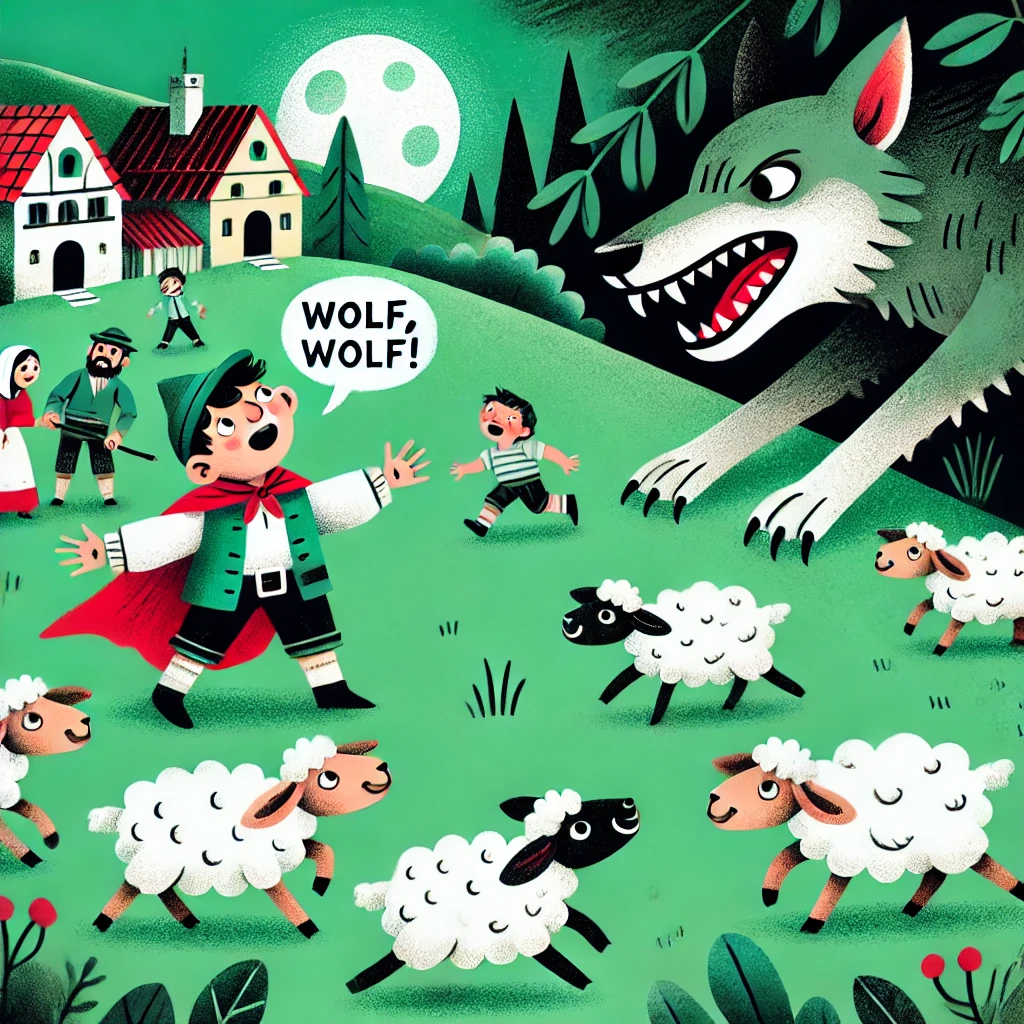There was once a young Shepherd Boy who watched his sheep near a dark forest. He was lonely all day, so he thought of a way to get some company and fun. He ran to the village and shouted, “Wolf, Wolf!” The villagers came out to help him, and some stayed with him for a while. The boy was so happy that a few days later, he played the same trick again. And again, the villagers came to help him.
But one day, a real Wolf came out of the forest and started to attack the sheep. The boy shouted, “Wolf, Wolf!” even louder than before. But this time, the villagers did not believe him because he had lied before, and no one came to help. So the Wolf ate many of the boy’s sheep. When the boy complained, the wise man of the village said:
“A liar is not believed, even when he tells the truth.”
Shepherd Boy – 羊飼いの少年
Watched – 見守った
Sheep – 羊
Dark forest – 暗い森
Lonely – 寂しい
Thought – 考えた
Way – 方法
Company – 仲間
Fun – 楽しみ
Ran – 走った
Village – 村
Shouted – 叫んだ
Wolf – 狼
Villagers – 村人たち
Came out – 出てきた
Help – 助ける
Stayed – 滞在した
Trick – いたずら
Played – おこなった(いたずらなどを)
Again – 再び
Real – 本物の
Attack – 襲う
Louder – もっと大声で
Believed – 信じた
Lied – 嘘をついた
Came to help – 助けに来た
Ate – 食べた
Complained – 不満を言った
Wise man – 賢者
Truth – 真実
1. There was once a young Shepherd Boy who watched his sheep near a dark forest.
- There was: 存在を表す構文。「There is/are」の過去形「There was」を使い、「〜がいた」という意味です。
- once: 副詞。「かつて」という意味で、物語の導入に使われる表現です。
- a young Shepherd Boy: 名詞句。「a」は不定冠詞、「young」は形容詞で「若い」、「Shepherd Boy」は「羊飼いの少年」を指します。
- who watched his sheep: 関係代名詞「who」で「Shepherd Boy」を説明しています。「watch(見守る)」の過去形「watched」を使い、「羊を見守っていた少年」という意味を作っています。
- near a dark forest: 前置詞句。「near」は「〜の近くに」、「a dark forest」は「暗い森」という意味で、全体で「暗い森の近くで」という意味になります。
2. He was lonely all day, so he thought of a way to get some company and fun.
- He was lonely: 主語「He(彼)」+動詞「was(〜だった)」+形容詞「lonely(寂しい)」の構造で、「彼は寂しかった」という意味です。
- all day: 副詞句。「一日中」を意味します。
- so: 接続詞で、「だから」という意味を持ち、前の文の結果を示しています。
- he thought of a way: 主語「he(彼)」+動詞「thought(考えた)」の過去形+「of a way」で、「方法を考えた」という意味です。
- to get some company and fun: 不定詞句「to get」で「仲間と楽しみを得るために」という意味になります。「company(仲間)」と「fun(楽しみ)」は名詞です。
3. He ran to the village and shouted, “Wolf, Wolf!”
- He ran to the village: 主語「He(彼)」+動詞「ran(走った)」の過去形+前置詞句「to the village(村へ)」で「彼は村へ走った」という意味です。
- and shouted: 接続詞「and(そして)」+動詞「shouted(叫んだ)」の過去形で「そして叫んだ」という意味です。
- “Wolf, Wolf!”: 直接話法で「狼だ!狼だ!」というセリフをそのまま表しています。
4. The villagers came out to help him, and some stayed with him for a while.
- The villagers: 主語。「villagers(村人たち)」に定冠詞「the」が付き、特定の村人たちを指します。
- came out: 動詞「come(来る)」の過去形「came」+副詞「out(外へ)」で「出てきた」という意味です。
- to help him: 不定詞句。「to help(助けるために)」で「彼を助けるために」という意味です。
- and some stayed with him: 接続詞「and(そして)」で結ばれた2つの文。「some(何人か)」は主語で、「stayed(滞在した)」は動詞の過去形、「with him(彼と一緒に)」が続きます。
- for a while: 副詞句。「しばらくの間」を意味します。
5. The boy was so happy that a few days later, he played the same trick again.
- The boy was so happy: 主語「The boy(少年)」+動詞「was(〜だった)」+形容詞「happy(幸せ)」で「少年はとても嬉しかった」という意味です。「so」は「とても〜なので」を表す副詞です。
- that a few days later: 接続詞「that(〜なので)」で、結果を導く節が続きます。「a few days later」は「数日後」という意味です。
- he played the same trick again: 主語「he(彼)」+動詞「played(行った)」+目的語「the same trick(同じいたずら)」+副詞「again(再び)」で、「彼は再び同じいたずらを行った」という意味です。
6. And again, the villagers came to help him.
- And again: 接続詞「and(そして)」+副詞「again(再び)」で、「そして再び」という意味です。
- the villagers came to help him: 主語「the villagers(村人たち)」+動詞「came(来た)」+不定詞句「to help him(彼を助けるために)」で、「村人たちは彼を助けに来た」という意味です。
7. But one day, a real Wolf came out of the forest and started to attack the sheep.
- But: 接続詞「しかし」という意味です。
- one day: 副詞句で「ある日」を意味します。
- a real Wolf: 名詞句。「real(本物の)」が「Wolf」を修飾しています。「本物の狼」という意味です。
- came out of the forest: 動詞「came(来た)」の過去形+前置詞句「out of the forest(森から外に)」で「森から出てきた」という意味です。
- and started to attack the sheep: 接続詞「and(そして)」+動詞「started(始めた)」の過去形+不定詞「to attack(攻撃する)」で「攻撃し始めた」という意味です。
8. The boy shouted, “Wolf, Wolf!” even louder than before.
- The boy shouted: 主語「The boy(少年)」+動詞「shouted(叫んだ)」の過去形で「少年は叫んだ」という意味です。
- “Wolf, Wolf!”: 直接話法で、「狼だ!狼だ!」と叫んだことを示しています。
- even louder than before: 比較級の表現。「even」は強調、副詞「louder(もっと大きな声で)」が「than before(以前よりも)」を修飾しています。「以前よりもさらに大声で」という意味です。
9. But this time, the villagers did not believe him because he had lied before.
- But this time: 接続詞「But(しかし)」+副詞句「this time(今度は)」で「しかし今回は」という意味です。
- the villagers did not believe him: 主語「the villagers(村人たち)」+助動詞「did not(〜しなかった)」+動詞「believe(信じる)」の原形+目的語「him(彼)」で「村人たちは彼を信じなかった」という意味です。
- because he had lied before: 接続詞「because(なぜなら)」で理由を説明する節が続きます。「he」は主語、「had lied」は過去完了形で「嘘をついた」という意味です。「before」は副詞で「以前に」を表します。
10. So the Wolf ate many of the boy’s sheep.
- So: 接続詞「だから」という意味で、前の文の結果を説明します。
- the Wolf ate: 主語「the Wolf(狼)」+動詞「ate(食べた)」の過去形で「狼は食べた」という意味です。
- many of the boy’s sheep: 名詞句。「many of(〜の多く)」+「the boy’s sheep(少年の羊)」で「少年の羊の多く」を意味します。
11. When the boy complained, the wise man of the village said:
- When the boy complained: 時を表す副詞節。「When(〜の時)」+主語「the boy」+動詞「complained(不満を言った)」で「少年が不満を言った時」という意味です。
- the wise man of the village: 名詞句。「the wise man(賢者)」に「of the village(村の)」が付いて「村の賢者」を意味します。
- said: 動詞「say」の過去形「said(言った)」です。
12. “A liar is not believed, even when he tells the truth.”
- A liar is not believed: 主語「A liar(嘘つき)」+受動態「is not believed(信じられない)」で「嘘つきは信じられない」という意味です。
- even when: 接続詞で「たとえ〜の時でも」という意味です。
- he tells the truth: 主語「he(彼)」+動詞「tells(言う)」+目的語「the truth(真実)」で「彼が真実を言っている時でも」という意味です。



コメント